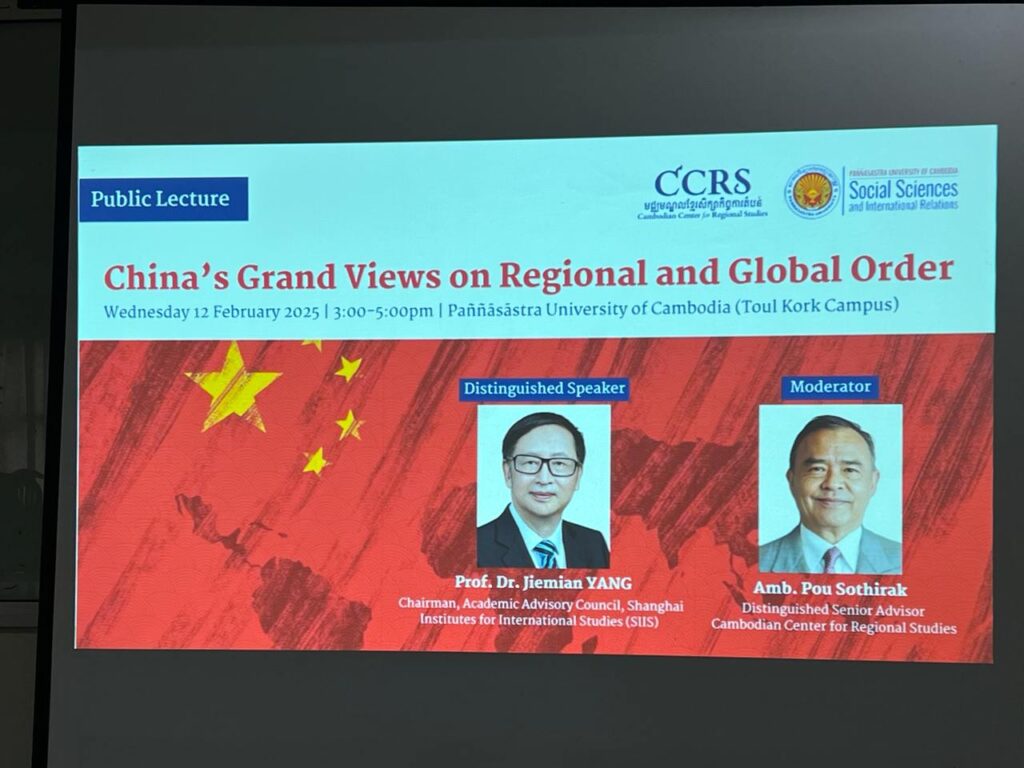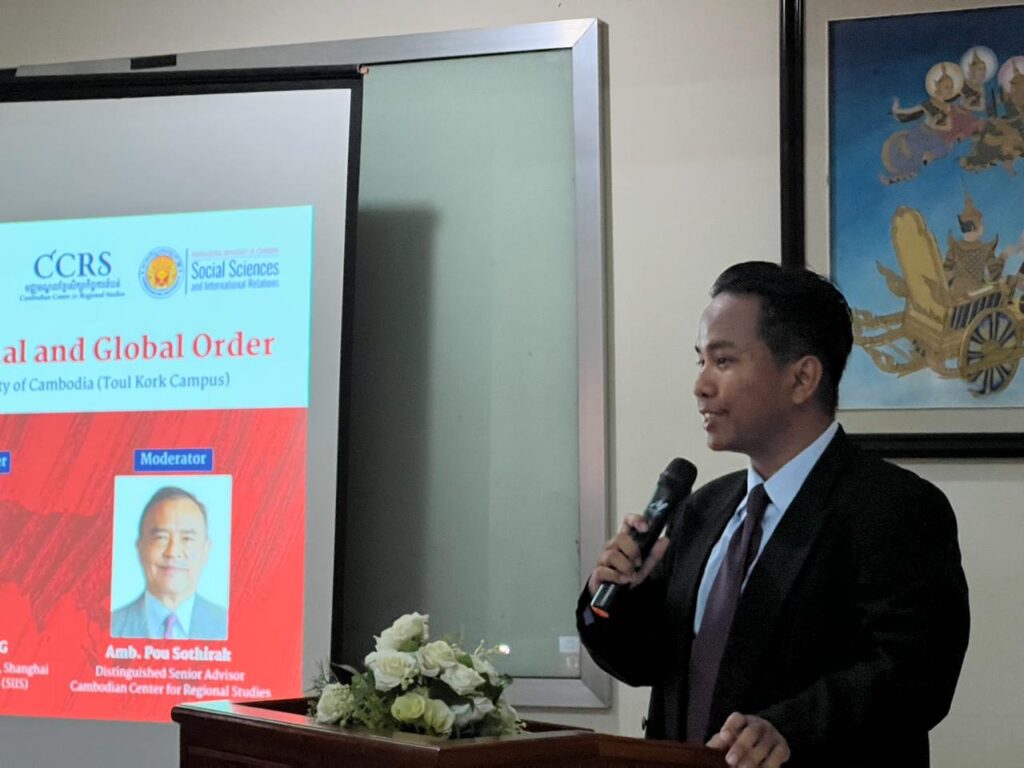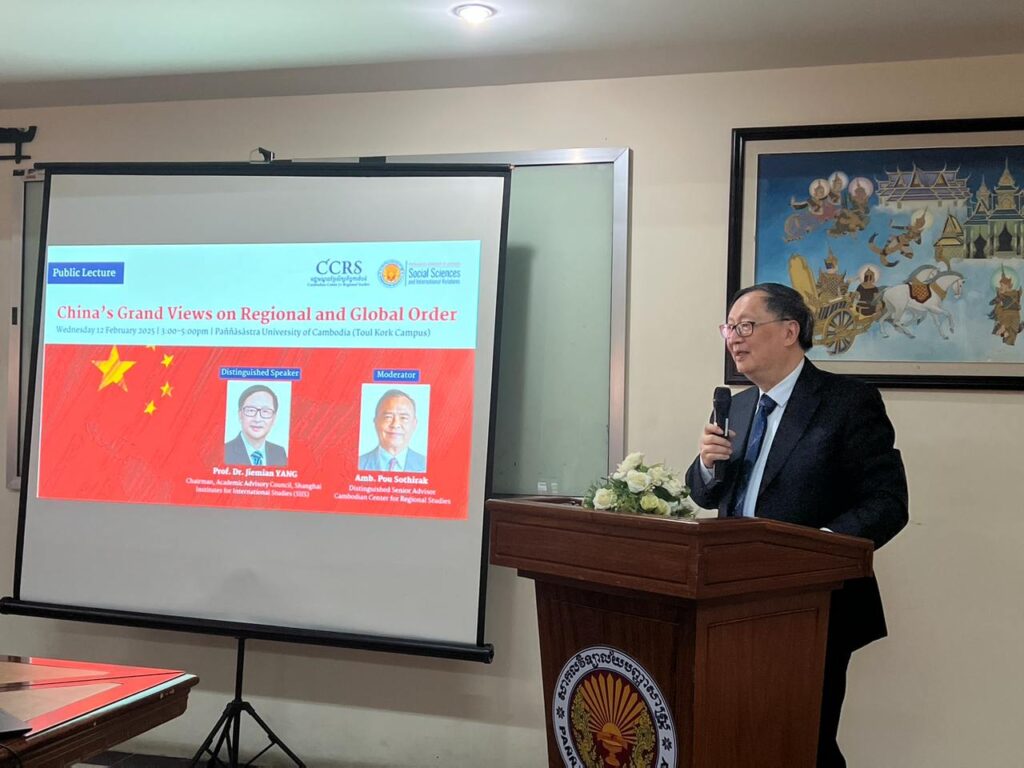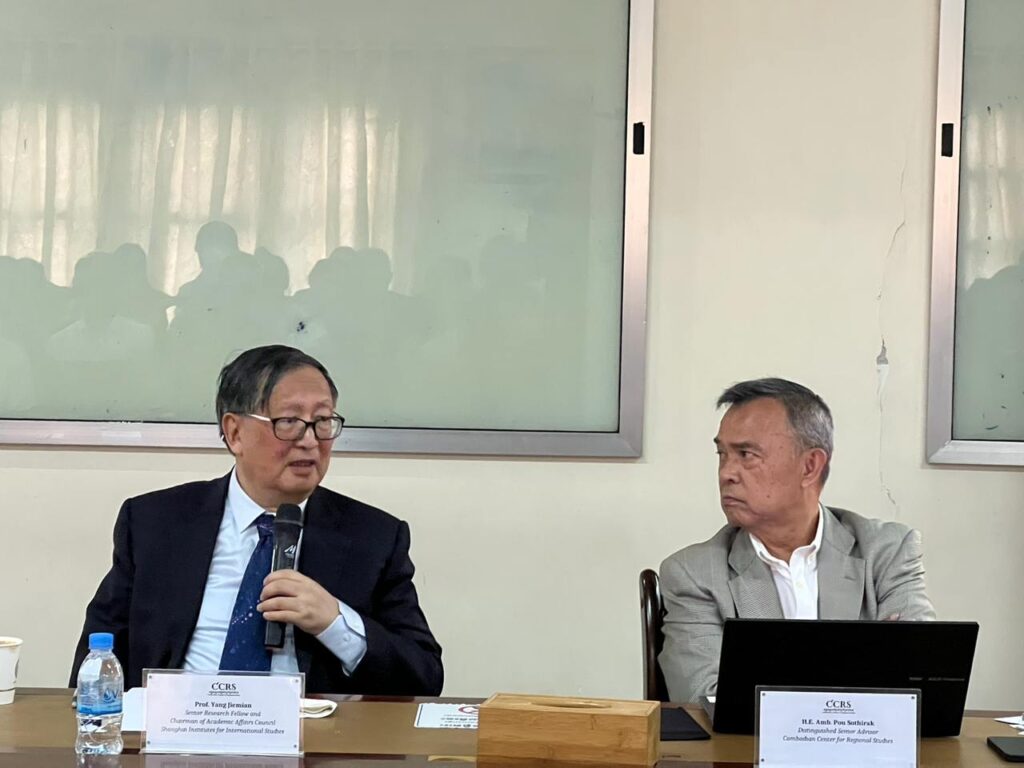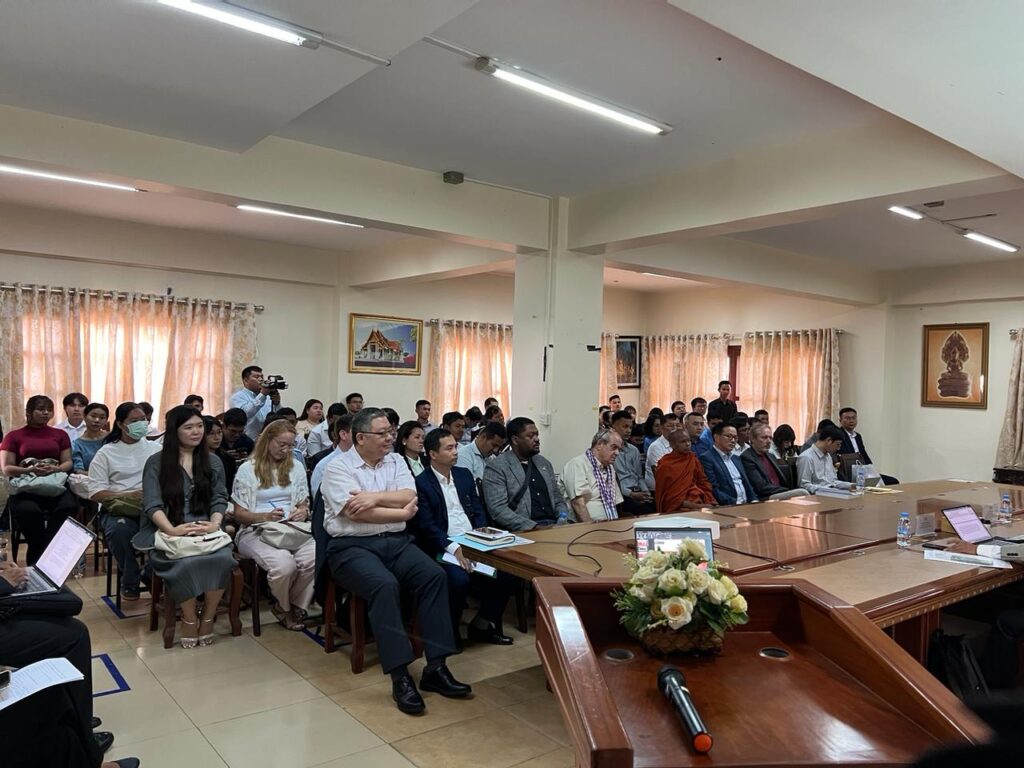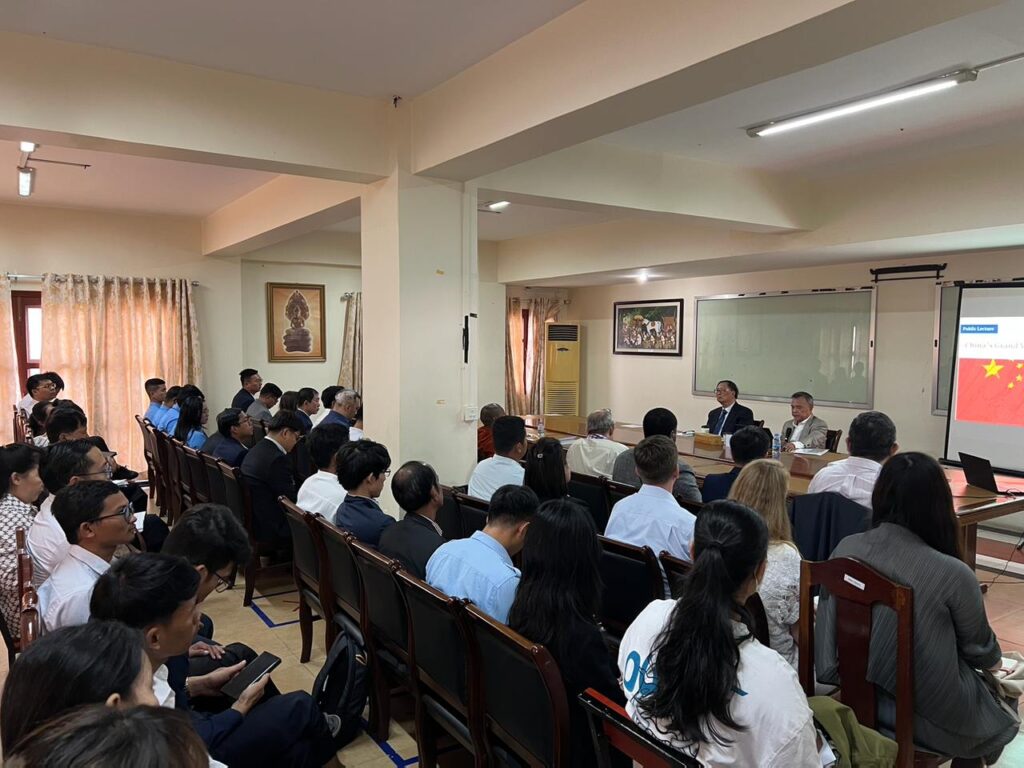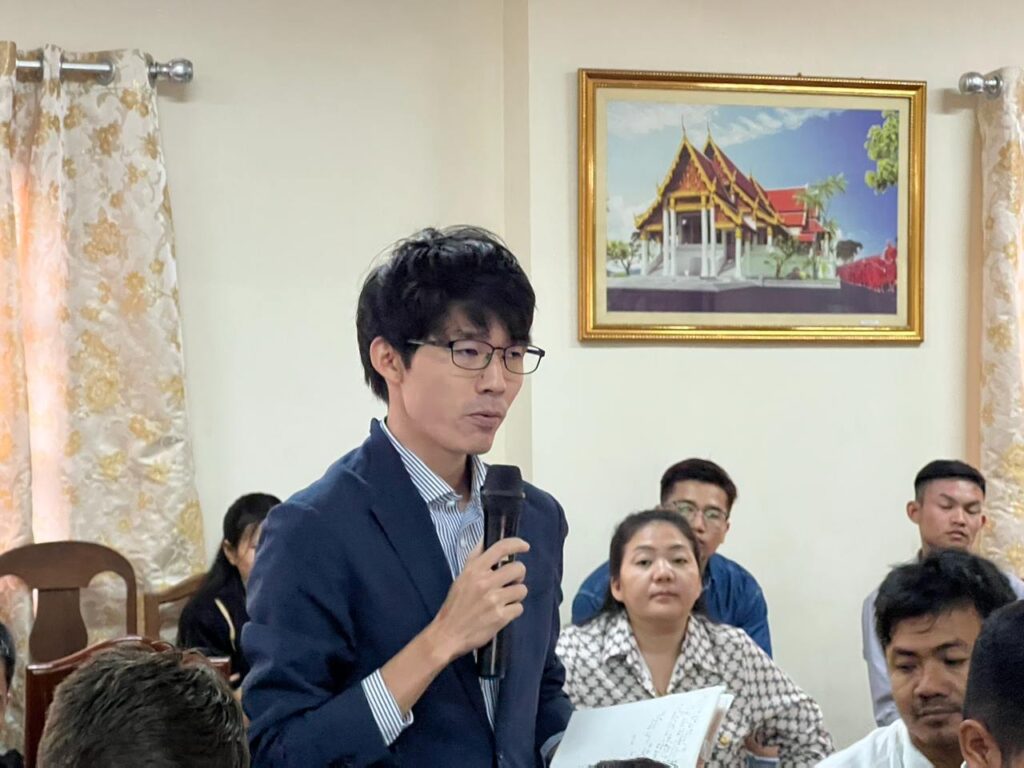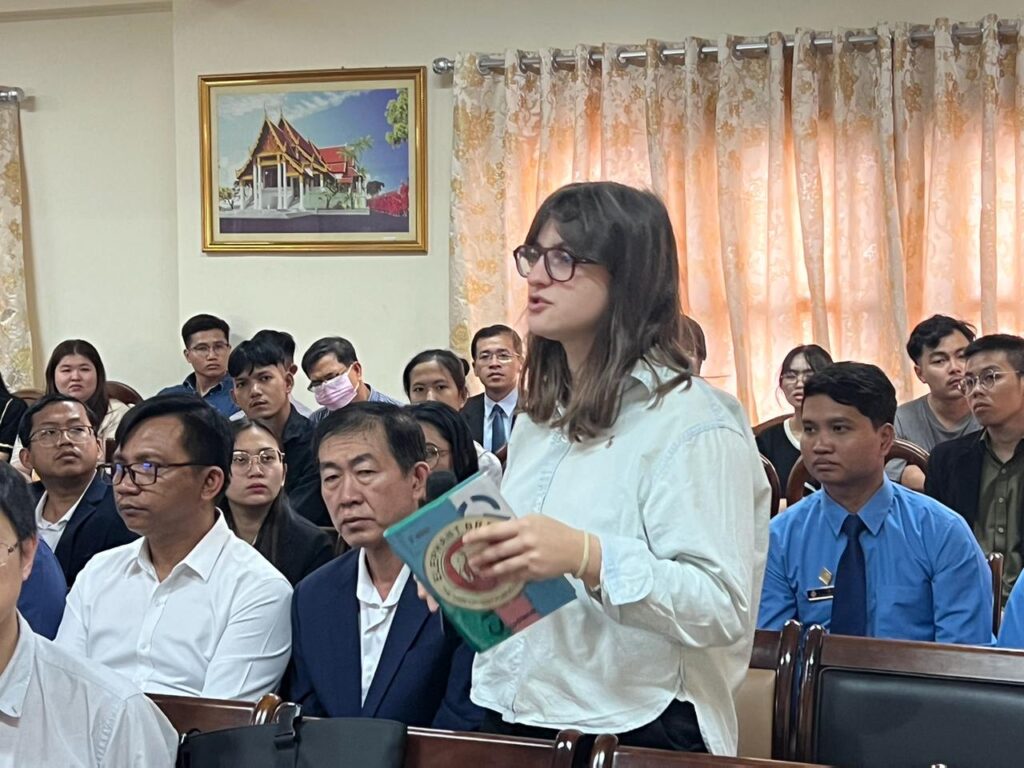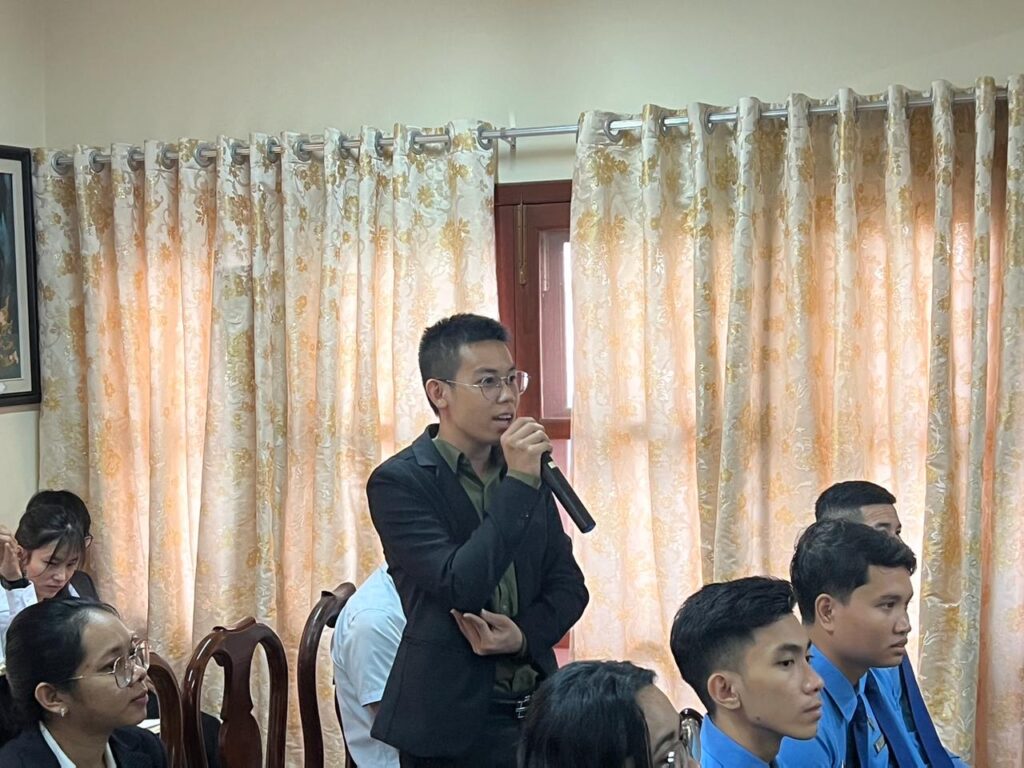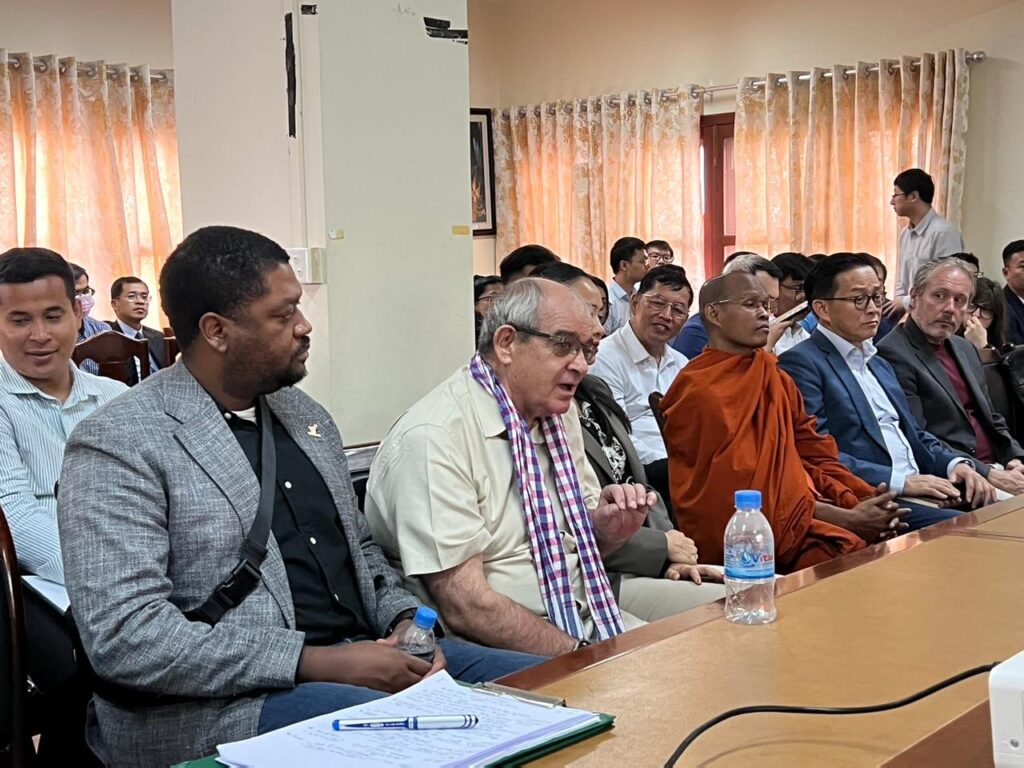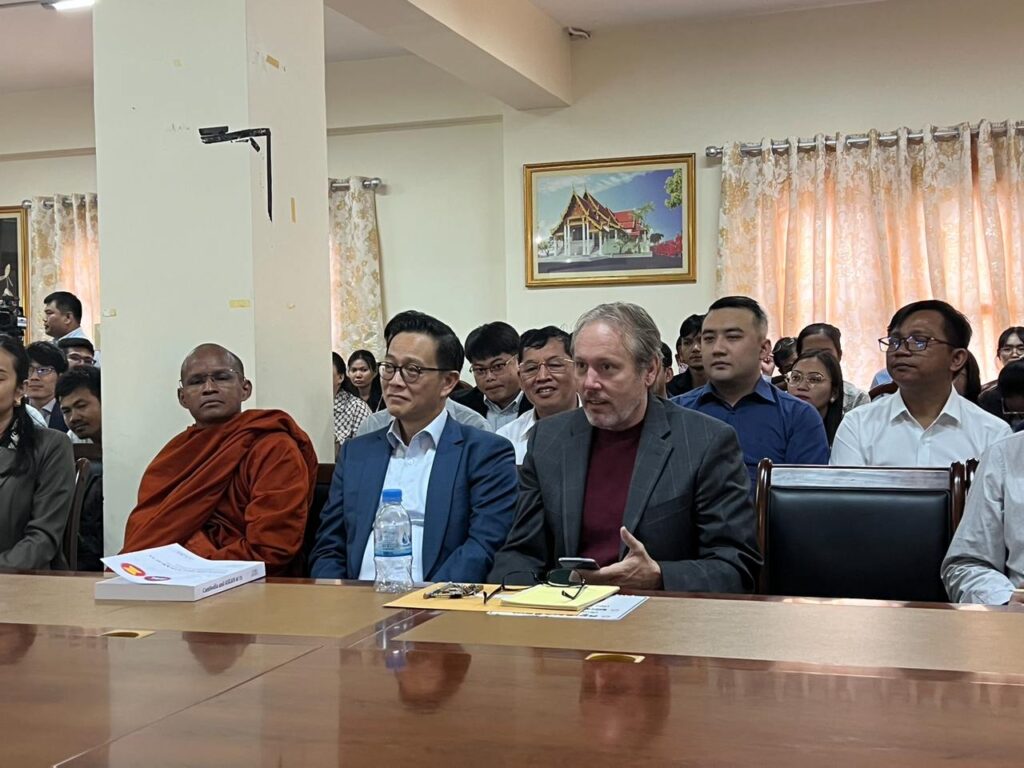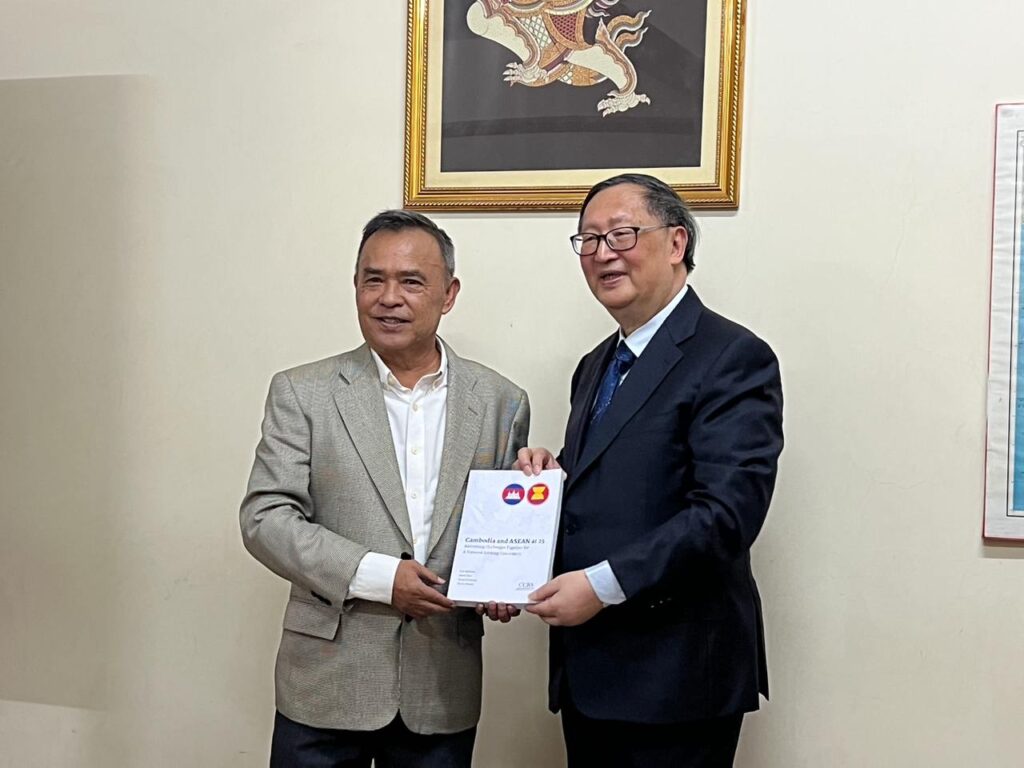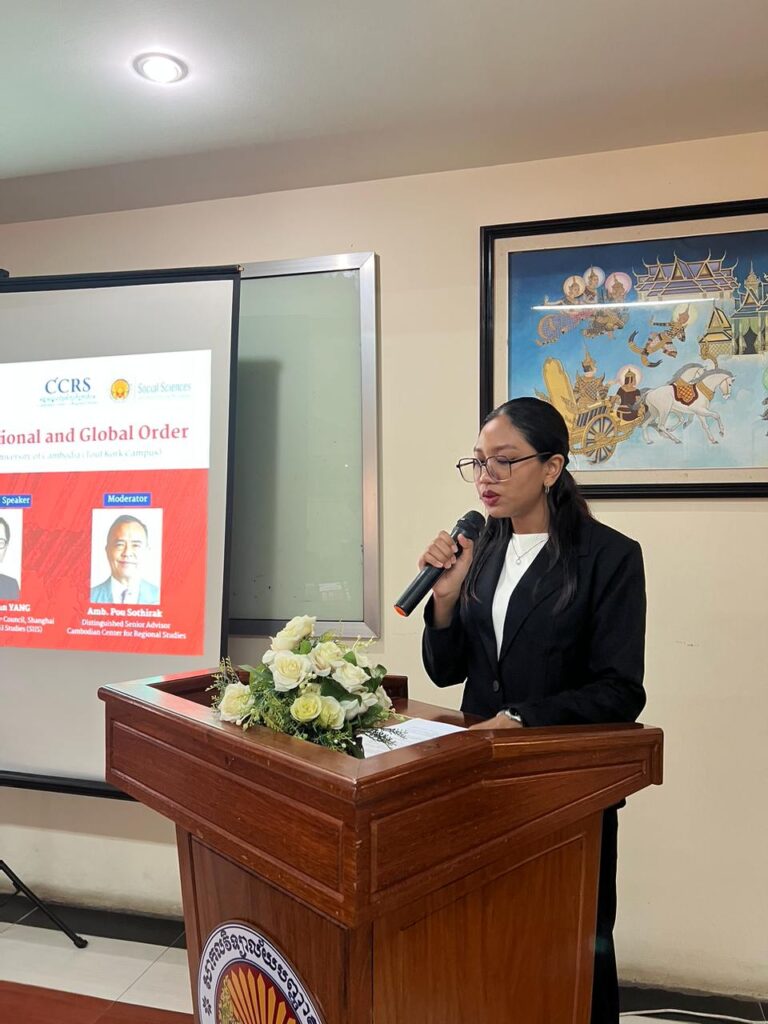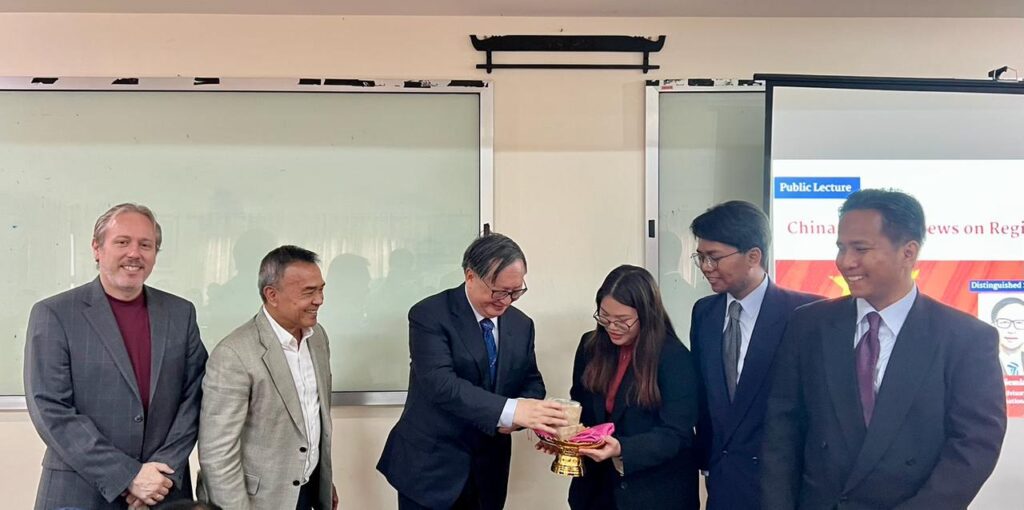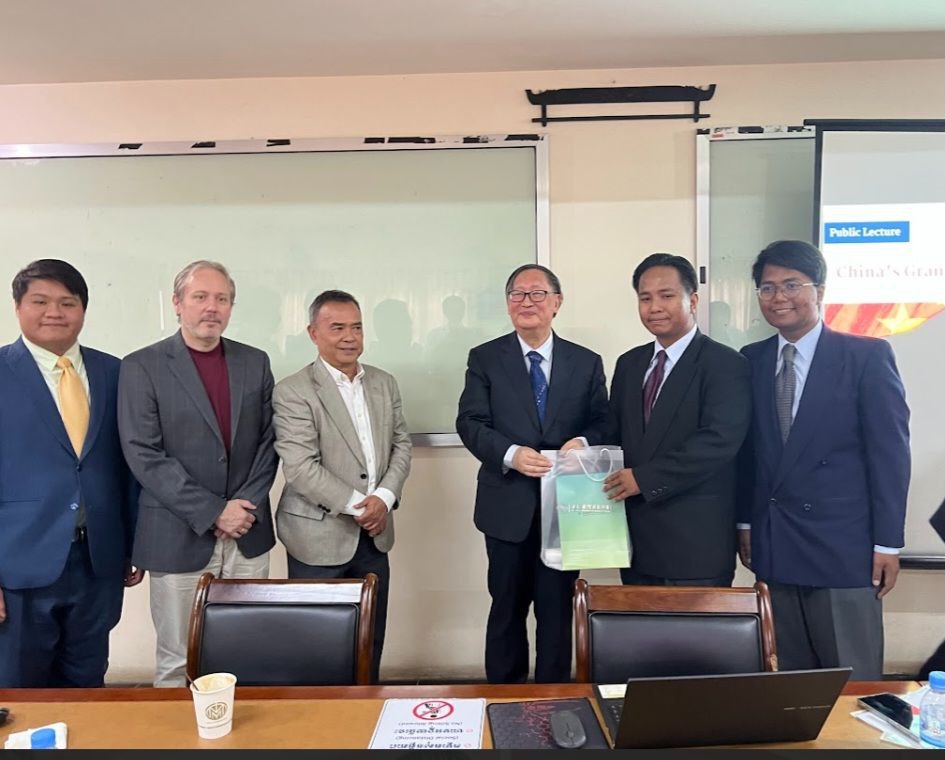On 12 February 2025, from 3:00-5:00pm, at Paññāsāstra University of Cambodia’s Toul Kork Campus, the Cambodian Center for Regional Studies (CCRS) organized a public lecture on “China’s Grand Views on Regional and Global Order” by Distinguished Speaker, Prof. Yang Jiemian, Senior Research Fellow and Chairman of Academic Affairs Council, Shanghai Institutes for International Studies.
There were about 70 participants from the Senate, the National Assembly, various Ministries of the Royal Government of Cambodia, members of the diplomatic corps, think tank communities, academia, and university students.
Mr. Him Raksmey, Executive Director of CCRS, extended a warm welcome to all participants to the lecture, and stated that today’s lecture is about China’s evolving worldviews and strategic approaches to shape future of global and regional order. He expressed appreciation to the Faculty of Social Sciences and International Relations of the Paññāsāstra University of Cambodia for the support of the event.
Amb. Pou Sothirak, Distinguished Senior Advisor to CCRS moderated the lecture. Before handing the floor to Prof. Yang to deliver his presentation, Amb. Pou Sothirak, Distinguished Senior Advisor to CCRS, made a short introductory remark highlighting China emerges as the world’s most prominent and upholding an equal and orderly multipolar world. Being the largest driving force for global economic growth, contributing around 30 percent, China promotes win-win cooperation to boosts high-quality development by opening-up trade and investment liberalization and facilitation while ensuring stable and smooth global industrial and supply chains. For China, closer cooperation among countries around the world is needed to overcome multiple challenges and Beijing expresses willingness to work with all parties to follow the current trends, share opportunities, overcome challenges and promote development together, building a community with a shared future for mankind and making greater contributions to safeguard and promote world peace, stability, development and prosperity.
Prof. Yang Jiemian gave a stimulating lecture on how China projects its grand views in the regional and global order.
The distinguished speaker started by mentioning that in contemporary China, President Xi Jinping considers diplomacy as the guideline for China’s foreign policy and the key to understanding China’s relations with the outside world. In China, terms such as international system, world order and global governance are used interchangeably.
China has a longtime civilization, dating back as long as 5,000 years. The country has undergone many patterns of history from central plains to unified China, expanding but with limited worldviews and unprepared for the upheavals in modern time. In the 20th century, as the country transitioned from the leadership of Chairman Mao Zedong and Chairman Deng Xiaoping, China embraced the Forward-looking Strategy in the 21st Century.
China’s current views on Global/Regional Orde are based on its active part in the reform and development of the global governance system to be fairer and more equitable, featuring shared growth through discussion and collaboration. China upholds true multilateralism, and promotes greater democracy in international relations while promoting friendships and partnerships on the principles of amity, sincerity, mutual benefit, and inclusiveness.
Regarding China’s future-oriented block-building approaches, the Community of Shared Future for Mankind has acquired its centrality in China’s foreign affairs through block building from global to bilateral levels. Globally, China’s key efforts include three Global Initiatives on Development, Security and Civilization. Inter-regionally, important mechanisms are in place such as Belt and Road Initiative, China’s community-building with Africa, and cooperative mechanism with Latin America and the Caribbean. Regionally and subregionally, initiatives set forth including China’s community-building with Southeast and Central Asia, and cooperative mechanisms with the ASEAN Plus Three, Arabic League and European Union. Bilaterally, China is working with partner countries to upgrade cooperative partnership, strategic partnership, and eventually to the community of shared future.
Assessing the regional order in the Asia Pacific, Prof. Yang mentioned that so far so good, given that the region has been able to avoid large scale conflict and no wars and achieved great economic progress, as well as enhanced regional awareness and set up important mechanisms such as ASEAN, ASEAN Plus, Conference on Interaction and Confidence Building Measures in Asia (CICA), Asia Pacific Economic Cooperation (APEC), and Asian Infrastructure Investment Bank (AIIB).
Nevertheless, the present status of the regional order is not so good given rises in tensions and confrontations between some regional groupings, and complicated interrelations among such global and regional powers. Asian Pacific Region has fall into confrontational mechanisms such as US led alliances and the QUAD as well as the complicated interrelations among such global and regional powers as the United States, China, Russia, India, Japan and so on.
The future of the regional order is even more demanding, according to Prof. Yang. This is the case because many of the existent regional institutions and mechanisms cannot play their designed or expected roles. These mechanisms need to be updated and refreshed its guiding principles and creative thinking along with new institutions, laws and regulations to meet the challenges of green economy, digital transition and regional order.
Concerning China’s orientation and action, China will continue to view the Asia Pacific as neighboring area where relates to the country’s core national interests and major concerns. China strives for a peaceful, stable and prosperous environment to facilitate its modernization and rejuvenation. As such, China will continue to put in place efforts to undertake works of building the community of shared future, update and upgrade Asian values, and conduct strategic communications centered on aligning various long-term plans such as China’s modernization program and ASEAN Community Vision 2045.
Lastly, Prof. Yang discussed the important roles of think tanks in the region including providing policy recommendations, promote international exchanges and public reach-outs, and enhance self-confidence in their unique thinking and acting while continuing to learn from others.
The floor was then open for the participants to engage directly in discussions with the distinguished speaker and moderator. The followings are short summary of the Q and A session:
Question: What are China’s efforts after US’ retreating from some international institutions?
Answer: The US’ decision to retreat from some international institutions such as World Health Organization (WHO) reflects the US’ foreign policy priority under President Donald Trump. Meanwhile, China is keen to play active roles in international institutions that contribute to global peace.
Question: What constitutes China’s global and regional leadership roles?
Answer: China will do its utmost best to increase its international and regional roles gradually within its means. While China grows in national strength, there are also many domestic preoccupations that the country has to prioritize.
Question: Can US and China co-exist and cooperate?
Answer: Asia Pacific is big enough both the US and China. The two superpowers should prioritize cooperation in areas of mutual interests over confrontations.
Question: What are the challenges of Cambodia-China relations?
Answer: There are three challenges:
Gaps exist on how the two sides see leadership changes. Chinese leaders are groomed and take office at the age of 60 and above whereas in the case of Cambodia, leader is prepared to take the helm of the government at younger age around mid-40.
Trade imbalance exists between China and Cambodia. China exports more and imports less from Cambodia. Whereas Cambodia exports less and import a lot more from China. There should be a better trade balance between the two sides
There are not enough people to people exchange between the two countries. Both sides should do more to promote people to people interaction and tourism.
Question: What are China’s views in global efforts in combatting key issues such as climate change and artificial intelligence?
Answer: On climate change, China is an advocate of reinvigorating existing mechanisms such as the Paris Agreement on Climate Change. Regarding artificial intelligence, China has been working with various countries to establish relevant international institutions to promote cooperation and healthy competition on this key emerging area.
Questions: What is China’s take on the BRICS expansion?
Answer: China has been working with partner countries to transform BRICS to greater BRICS which is open to more countries to join. The expansion of this grouping reflects the importance of greater benefits from cooperation, especially economic opportunities. The world is beyond geopolitics. There are many benefits in working together to enhance economic connectivity in platforms such as expanded BRICS.
Question: What is China’s response to the US involvement in the Taiwan issue?
Answer: Officially, the US still maintains the One China Policy although it also has unofficial relations with Taiwan based on its 1979 Taiwan Relations Act. Due to the deep interdependence between the US and China, it is within the US’ interest to engage China and respect China’s core interest in Taiwan. Nevertheless, China has also remained vigilant to all possible scenarios to avoid military confrontations or conflicts with the US over Taiwan.
Question: Does China aspire to become another super power like the US?
Answer: No, China does not aspire to become the superpower like the US given that there are more pressing domestic priorities that China has to attend to. China has tried its best to integrate in the existing world order. However, Beijing also wants the existing world order to be more rational and fairer.
Question: What are China’s views on pressures on ASEAN to choose sides between the US and China?
Answer: China respects ASEAN Centrality and each ASEAN member’s agency in conducting their own foreign policy. China never asks ASEAN members to choose. Choosing sides or not is up to each ASEAN members’ decision. However, ASEAN can make friends with both the US and China because of the many important benefits to do so.
In closing, Amb. Pou Sothirak expressed appreciation to the distinguished speaker for the interesting public lecture. The audience was able to learn a lot from the substances of this talk. He extended thankfulness to all the participants for engaging actively during the discussion.
The lecture was concluded cordially.
